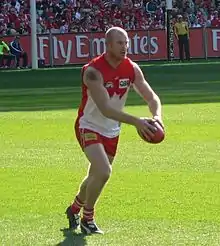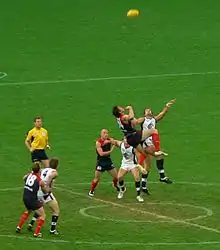Mental health in the Australian Football League
Mental health refers to a person's mental state, well-being,[1] and ability to cope with the daily stresses of life.[2] Good mental health also means that one has the ability to be mentally resilient, have a good life balance, having an absence of mental disorders and the ability to enjoy life.[3] Elite athletes such as those competing in the Australian Football League(AFL), are at higher risk of developing a mental health disorders such as depression, anxiety, social anxiety, panic attacks and eating disorders.[4] 16–34 years olds are also in the high risk category, which is the average age of a football player and extends to those who are being drafted,[5] this puts AFL players in both high risk categories.[6] A study conducted by Helen Christensen and Alison Parsons showed that 1 in 5 elite athletes suffered depressive symptoms.[6] Playing elite sports is a great challenge emotionally, mentally as well as physically,[7] some players can cope with all of these pressures while others cannot handle it and therefore suffer from a lack of mental health.
Society and culture
AFL players are often forced to conform to the norms but also have high expectations placed on them such as extraordinary behavior, appearance and performance.[8] They are perceived to be tough, and mentally tough, if they conform to these norms and display qualities such as having self-belief, mental and emotional resilience and a tough attitude.[9] They are also expected to be extremely masculine and not show signs of emotional stress and upset, if they show these signs they are then perceived as weak and tend to be dropped from the team or squad.[8] Usually only 35% of elite athletes will seek help from a professional as they tend to believe they are alright and can get better by themselves. They tend to be worried about others finding out about these issues as there seems to be a social stigma that they are weak if they suffer from any of these problems.[4] The masculine stereotypes associated with AFL players is a potential barrier for players to come out and talk about their mental health problems.[10]
When a player exaggerates their negative performances or situations it often leads to mental health problems.[6] Media has a big role in all of this. Players are constantly scrutinized about performance, the way they act, the way they look, etc., and the players then see this and tend to dwell on all of the negatives. This messes with the players psychologically and places an added pressure on them to perform and act better.

History
There have been a few cases made public of AFL players suffering from mental health problems. In 2015 it was noted that Mitch Clark from Geelong Football Club has been suffering from mental health problems.[11] When questioned it was not spoken about very much and all quite hidden. He was withdrawn from the team even after a huge win which sparked conversation in the community but Mitch Clarke never spoke much about it.
Also in 2015 Adam Goodes took a week off training and playing because of the 'emotional toll'[12] he was put under during the season, receiving boos and racist comments from the crowd. He was also under analyses by the media which was all too much for him so it led to him taking time off and away from the sport.
Barry Hall was also seen to be suffering mental health problems, admitting he had been suffering depression throughout his AFL career and that he "had nothing to get out of bed for" (Hall, 2011). Simon Hogan was another player who came out about their depression and had contemplated killing himself during his career. Lance Picioane who played for Adelaide, Hawthorn and the Kangaroos said how he struggled to understand that he was actually suffering from depression and that it wasn't him just feeling a little bit down.[10]
Wayne Schwass, Nathan Thompson and Heath Black are other players who have come out and spoken about their struggle with anxiety and depression throughout their football careers.
Causes
There are many factors that lead to bad mental health in AFL players.
Pressures and expectations
Pressure to win and to perform well week in and week out contributes to the bad mental state of some AFL players. Having such a heavy burden on their shoulders impacts their state of mind, and when they do under perform this can negatively affect a players mental health.[4][6] There are also pressures from society to act professionally and look the part,[4] be fit, strong and well groomed. They have high expectations on them as players and are encouraged to be the ideal male who is masculine, athletic, strong etc.. and this pressure is coming from within the club as well.[8] If a player has a bad game it is written all over the media and it is hard for it not to affect the player emotionally.
Injuries
Injury and the risk of injury also contributes to this lack of mental health because if a player does become injured they will have a lower or no income and their position in next season is on the rocks so knowing this makes them stress. Being injured also means they cannot exercise as much and this sudden drop in physical activity levels makes the player more likely to become anxious or depressed as physical activity is a mood enhancer.[13] On average a total of 40 players miss a total of 142 games a season.[14] This is a huge number and a constant lingering concern for players. The whole process of finding out about their injury to rehabilitation and returning to the sport is an emotional roller-coaster for players as they have strong negative feelings when they find out about their diagnosis, to struggling through rehab then having the pressure to perform.[15]
Head injuries may affect the mind more directly.

Other
The pressure of location and relocation is another toll on players. When drafting comes around young players are unsure what team will draft them. Having to relocate their entire lives to go train and play with a team is such a stress on the young players and can cause anxiety.[5] Starting in a new team with new people, a new training structure and lifestyle can be a big shock to some players and they may experience social anxiety and exclusion which could lead to negative thoughts.
During the week each player is critiqued by coaching staff to see where they can improve in their game, but constantly being under the pump can be mentally exhausting for players.[5]
The environment in which they live and train in impacts a players mental health as it can affect the mental resilience which they build and creates their personality which could affect if they fit in or not.[7] It also affects their natural resiliency to tough situations and how they handle things that come their way. If they do not have support from either family or friends everything can fall apart.
Prevention and treatment
Prevention, intervention and treatment for mental health has been neglected for quite some time and has never been a high priority to create groups to support this.[16] 844 000 people commit suicide every year[16] in the world so it is vital something is done to help the AFL players. It is shown that organised programs are one of the most effective ways to help treat mental illnesses such as depression and having a full-time staff member to facilitate this would be a greater benefit.[17]
AFL mental health framework
AFL has put a framework in place to ensure the best mental health of the players and it encourages early identification and intervention. They hope to remove any stigmas from society and the people involved in AFL about mental health disorders. They aim to educate their players on mental health issues with online, face to face and peer to peer programs. They are hoping to create a space where the industry is able to recognize symptoms and to aid in early intervention.
"Manage Your Mind" well-being program
This is a program set up by the AFL Players Association, teaching players about the signs and symptoms of mental illness so they can better understand the difference between feeling a bit sad one day and depression. Through a three session course players are exposed to realizing their own values, different mental health stories and how these both relate back to their lives and then being able to change anything they aren't happy with. They are also taught about different emotions and ways to surface them and talk about them to other people.[5]
AFL Players Association programs
The AFL Players Association also have two other programs similar to the Manage Your Mind Well-being Program. Practical Mindfulness is another which is a hands on course that helps the players to be able to manage stress and build resilience to all the negative influences.[18] Team wise is the third program they offer which is targeted at coaching staff, captains and influential players to develop skills in aiding other players to speak up and to be positive role models.[10]
See also
References
- "the definition of mental health". Dictionary.com. Retrieved 31 August 2015.
- "CDC - Mental Health Basics - Mental Health". www.cdc.gov. Retrieved 31 August 2015.
- "Life skills and mental health - ProQuest". search.proquest.com. Retrieved 2 September 2015.
- "BMC Psychiatry | Full text | Barriers and facilitators to mental health help-seeking for young elite athletes: a qualitative study". www.biomedcentral.com. Retrieved 31 August 2015.
- "Manage Your Mind Wellbeing Program". Retrieved 2 September 2015.
- Gulliver. A; Griffiths. K. M.; Mackinnon. P. J.; Stanimirovic. R. (2014). "The mental health of Australian elite athletes". Journal of Science and Medicine in Sport. 18 (3): 255–61. doi:10.1016/j.jsams.2014.04.006. hdl:1885/14049. PMID 24882147.
- Denny, Katherine G (2009). "External and internal factors influencing happiness in elite collegiate athletes". Child Psychiatry and Human Development. 40 (1): 55–72. doi:10.1007/s10578-008-0111-z. PMID 18626767.
- Coulter, Tristan J.; Mallett, Clifford J.; Singer, Jefferson A. (1 January 2016). "A subculture of mental toughness in an Australian Football League club" (PDF). Psychology of Sport and Exercise. 22: 98–113. doi:10.1016/j.psychsport.2015.06.007.
- Gucciardi, Daniel F.; Gordon, Sandy; Dimmock, James A. (18 July 2008). "Towards an Understanding of Mental Toughness in Australian Football". Journal of Applied Sport Psychology. 20 (3): 261–281. doi:10.1080/10413200801998556. ISSN 1041-3200.
- "Proactive approach to mental health". Retrieved 2 September 2015.
- Pierk & Niall (2015). "The Age".
- Wu, Andrew (2015). "Sydney Morning Herald".
- Eriksson, S., & Gard, G. (2011). Physical exercise and depression. Physical Therapy Reviews, 16(4), 261-268. doi:10.1179/1743288X11Y.0000000026
- Orchard, J; Seward, H (1 February 2002). "Epidemiology of injuries in the Australian Football League, seasons 1997–2000". British Journal of Sports Medicine. 36 (1): 39–44. doi:10.1136/bjsm.36.1.39. ISSN 0306-3674. PMC 1724448. PMID 11867491.
- Ruddock-Hudson, Mandy; o'Halloran, Paul; Murphy, Greg (2014). "The Psychological Impact of Long-Term Injury on Australian Football League Players". Journal of Applied Sport Psychology. 26 (4): 377. doi:10.1080/10413200.2014.897269.
- World, H. O. (2010). Mental Health Development : Targeting People with Mental Health Conditions as a Vulnerable Group. Albany, NY, USA: World Health Organization (WHO). Retrieved from http://www.ebrary.com.ipacez.nd.edu.au
- Simon, Gregory E.; Ludman, Evette J. (1 January 2013). "Should Mental Health Interventions Be Locally Grown or Factory-Farmed?". American Journal of Psychiatry. 170 (4): 362–5. doi:10.1176/appi.ajp.2013.13010043. PMC 4249622. PMID 23545790.
- "Mind Mechanics". Retrieved 2 September 2015.